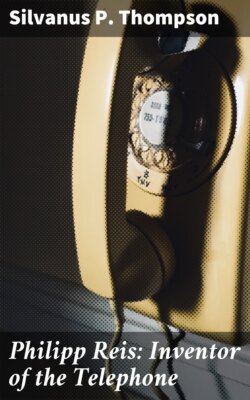Читать книгу Philipp Reis: Inventor of the Telephone - Silvanus P. Thompson - Страница 23
На сайте Литреса книга снята с продажи.
II.—Reis’s Telephone, in the hands of Reis and his contemporaries, did transmit speech.
ОглавлениеTable of Contents
Of the performance of his instruments Reis speaks modestly and carefully, nothing extenuating of his failures, nothing exaggerating of his successes. I shall not attempt to be wiser than he; nor seek to make out his instrument to have been either more perfect or more reliable than he himself knew it to be. The membrane tympanum of his transmitter was liable to become relaxed by the moisture of the breath rendering the instrument—as Graham Bell found fifteen years later with his membrane magneto-transmitters—uncertain in its action. Moreover, in some earlier forms of Reis’s transmitter, notably those with a vertical tympanum, the adjustment of the contact-points that controlled the current was a matter of delicacy requiring experience and practice, so that casual experimenters failed to obtain the results which Reis himself obtained;[11] they obtaining only a noisy snarl where he obtained intelligible speech. Lastly, the very delicacy of the essential parts, the conducting strips of metal which lay lightly in contact against one another, militated against a uniformity of success when tried with different voices, some of which were too low to produce any effect, others so loud as to rattle the delicate contact-pieces in a manner fatal to the attainment of the desired result.
In spite of all these drawbacks, which were not inherent in the principle of the instrument, there is plenty of evidence that Reis’s Telephone did transmit speech. Reis himself records this fact:
(1.) In 1861, in his memoir ‘On Telephony’ (see p. 58), “The consonants are for the most part tolerably distinctly reproduced, but the vowels not yet in an equal degree.”
(2.) In his ‘Prospectus’ (p. 86) Reis says that the tones of organ-pipes and of the piano can be reproduced as well as the tones of the human voice, “according to my experience.”
(3.) The fact is attested by Inspector Wilhelm von Legat, in his Report in the ‘Zeitschrift’ (p. 77), 1862. After alluding to the indistinctness of the vowels, he says: “Single words, uttered as in reading, speaking, and the like, were perceptible indistinctly, nevertheless, here also the inflexions of the voice, the modulations of interrogation, exclamation, wonder, command, etc., attained distinct expression.”
(4.) Professor Quincke, of Heidelberg, testifies (see p. 113) that he heard and understood words spoken through a Reis Telephone in 1864.
(5.) Professor Böttger, editor of the ‘Polytechnisches Notizblatt,’ in 1863 says (see p. 90): “The experimenters could even communicate words to one another, though certainly indeed, only such as had often been heard by them.”
(6.) Dr. Rudolph Messel, an old pupil of Reis, and an eye-witness of his early experiments, has written[12]: “There is not a shadow of a doubt about Reis having actually achieved imperfect articulation. I personally recollect this very distinctly, and could find you plenty more people who witnessed the same.”
(7.) Herr Peter, a former colleague of Philipp Reis, whose testimony will be found on page 126, narrates how he doubted the powers of the instrument until he had verified them for himself by speaking into it words which could not possibly be premeditated.
(8.) Mr. E. Horkheimer, who aided Reis in his earlier work, though he left Germany when the development of the instrument was yet very far from complete, has even given (see p. 117) a list of the words and expressions which he has heard transmitted by the earlier forms of the instrument.
(9.) Herr Philipp Schmidt, brother-in-law of Philipp Reis, and now acting-paymaster in the Imperial German Navy at Wilhelmshavn, says: “he succeeded finally in reproducing at a distance, words and whole sentences.” “There never was any understanding between my brother-in-law and myself as to particular words and sentences: on the contrary, these were quite spontaneous.”
(10.) Mr. S. M. Yeates, of Dublin, who in 1865 constructed a modified Reis Telephone (see p. 128), has thus described the performance of the instrument: “Before disposing of the apparatus, I showed it at the November meeting (1865) of the Dublin Philosophical Society, when both singing and the distinct articulation of several words were heard through it, and the difference between the speakers’ voices clearly recognised.”[13]
It is difficult to conceive how testimony on this point could be stronger. From so many different sources it is alike agreed that—with the instrument presumably in good adjustment—Reis’s Telephone, in the hands of Reis and his contemporaries, did transmit articulate speech.
